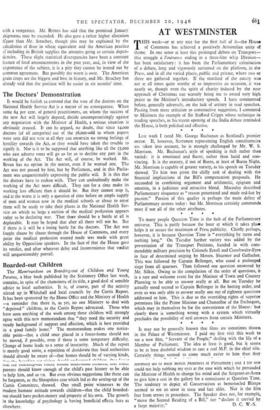The Doctors' Demonstration
It would be foolish to contend that the vote of the doctors on the National Health Service Act is a matter of no consequence. When some 64 per cent. of general practitioners, on whom the success of the new Act will largely depend, decide uncompromisingly against any negotiation with the Minister of Health, a serious situation is obviously created. It can be argued, no doubt, that since 14,000 doctors (of all categories) out of the 56,000-odd to whom papers were sent did not vote at all they can entertain no strong feelings of hostility towards the Act, or they would have taken the trouble to signify it. Nor is it to be supposed that anything like all the 23,000 who cast adverse votes will go so far as to decline any part in the working of the Act. The Act will, of course, be worked. Mr. Bevan has no option in the matter, even if he wanted one. The Act was not passed by him, but by Parliament, and in this Parlia- ment was unquestionably expressing the public will. It is this that the doctors have to reckon with. They can undoubtedly make the working of the Act more difficult. They can for a time make its working less efficient than it should be. But they cannot stop it, and at the worst it is only a question of time before an ample supply of men and women now in the medical schools or about to enter them will be ready to take their places in the National Health Ser- vice on which so large a section of the medical profession appears today to be declaring war. That there should be a battle at all is deplorable. It may be hoped that after all there will not be. But if there is it will be a losing battle for the doctors. The Act was fought clause by clause through the House of Commons, and every point the medical profession wanted made was made with great ability by Opposition speakers. In the face of that the House gave its verdict, and after whatever delay and inconvenience that verdict will unquestionably prevail.


































 Previous page
Previous page